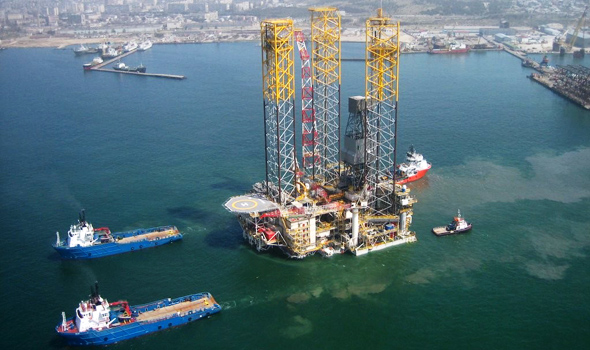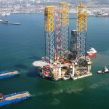
TAP Project Surging Ahead of Rival Nabucco-West (Part Two)
Publication: Eurasia Daily Monitor Volume: 10 Issue: 57
By:

The gas producers’ consortium at Shah Deniz in Azerbaijan is holding parallel negotiations with the pipeline project companies, Nabucco and Trans-Adriatic Pipeline (TAP), to select one of these routes to Europe. March 31 is the deadline for submission of Nabucco-West’s and TAP’s competing offers to the Shah Deniz consortium. The producer consortium’s decision on pipeline selection is due to be announced by June 31.
Within the Shah Deniz multinational consortium, four companies—the United Kingdom’s BP, Norway’s Statoil, Azerbaijan’s State Oil Company (SOCAR), and Total of France—directly participate in negotiations and decision-making. These have jointly signed parallel agreements with Nabucco and with TAP, respectively, preparatory to the final decision to select one pipeline route.
Each set of signed documents includes an Equity Option and Funding Agreement and a Cooperation Agreement. Under the equity and funding agreements, those Shah Deniz companies will fund project development costs for Nabucco-West and TAP, respectively, until the final decision on pipeline selection. In return for this, Nabucco and TAP give those Shah Deniz companies the option to enter either pipeline project as new shareholders and receive up to 50 percent of either project’s shares. Those Shah Deniz companies shall exercise that option with the pipeline project that they would ultimately select. Under the Cooperation Agreements, Nabucco and TAP each agree with those same Shah Deniz companies to exchange information and align pipeline project schedules with the Shah Deniz gas production schedule, again until the final decision on pipeline selection (Nabucco press release, January 19; TAP press release, January 22).
Uniquely, in its capacity as a Shah Deniz producer, Statoil, signed the agreement with Nabucco, and, in its capacity as a TAP partner, signed the agreement with the Shah Deniz producers, giving TAP a potential net advantage over Nabucco-West in that competition. Moreover, TAP’s January 22 agreement with the Shah Deniz producers (https://www.trans-adriatic-pipeline.com) is a draft Shareholder Agreement, initialed in preparation for a possible TAP Joint Venture that would give BP, SOCAR and Total up to 50 percent of TAP’s shares, leaving the remainder with TAP’s existing shareholders: Statoil, the Swiss AXPO and Germany’s E.ON Ruhrgas. This move also puts TAP one step ahead of Nabucco in their contest. Nabucco lost time when its lead company, Austrian OMV, unrealistically sought minority stakes in Shah Deniz and the Trans-Anatolia pipeline project, in return for Shah Deniz producers entering the Nabucco project as shareholders. Their entry remains possible but the time remaining is minimal.
On March 19, TAP and those same Shah Deniz companies (potential investors in TAP) jointly selected the French bank, Societe Generale, as financial advisor for TAP’s preparatory and, potentially, construction phases (TAP press release, March 19). Nabucco has not obtained a similar arrangement thus far.
The European Commission (executive arm of the European Union) seems to have shifted from its earlier, strategically motivated endorsement of Nabucco, to a politically grounded neutrality between Nabucco-West and TAP. While Nabucco-West runs entirely on European Union territory, and would bring supply diversification to EU member countries onerously dependent on Gazprom, most players in TAP are non-EU players, and the designated recipient countries do not necessitate further diversification of their gas supplies with any degree of urgency.
The TAP consortium’s current ownership is 85 percent non-EU (Norway’s Statoil 42.5 percent, the Swiss AXPO another 42.5 percent; while EU member Germany’s E.ON Ruhrgas owns 15 percent). Of TAP’s transit countries and small-scale designated importers, Greece is an EU country while Albania is not, although the Statoil-led TAP considers building its gas storage site in Albania. Insolvent Greece regards TAP primarily as a chance to help the country out of its economic crisis, and “turn Greece from a second-tier energy destination to a strategic transit point,” according to Greek Prime Minister Antonis Samaras at the signing of the TAP inter-governmental agreement (New Europe, February 13).
TAP’s main market destination, Italy, is well diversified with gas supplies delivered variously by pipelines and as liquefied natural gas (LNG) from North Africa, Russia and the Middle East. While Italy and Greece have access to LNG, the Nabucco-West countries do not, necessitating diversification of supplies by pipeline only. For its part, Switzerland uses natural gas for only 12 percent of its total energy consumption; but that gas seems to originate entirely in Russia (apparently delivered to Switzerland via Germany by E.ON Ruhrgas), and according to the Swiss Federal Office for Energy, the country needs to diversify its supply sources (Trend, February 19). According to the TAP consortium’s management, Caspian gas volumes reaching Italy can move onward to Switzerland, Germany and France, “contributing to the diversification of [their] supplies” (TAP press release, March 25; www.trans-adriatic-pipeline.com).
This reflects a turnabout from the original strategic rationale behind the EU-planned Southern Gas Corridor. That rationale was, primarily, supply security and diversification for some new member countries of the EU—the Nabucco countries and potentially their direct neighbors—by connecting those countries with the Caspian basin. Instead, TAP would divert the first available volumes of Caspian gas mainly to Western Europe.
Thus, accumulating indications suggest that Nabucco-West is losing ground to TAP when key deadlines for the Shah Deniz consortium’s pipeline selection decisions are imminent. The Nabucco consortium’s inherent weaknesses, compared to its stronger competitor (see accompanying article, Part One in EDM, March 26) are apparent, making it difficult to capitalize on Nabucco-West’s inherent advantages as a strategic project.




